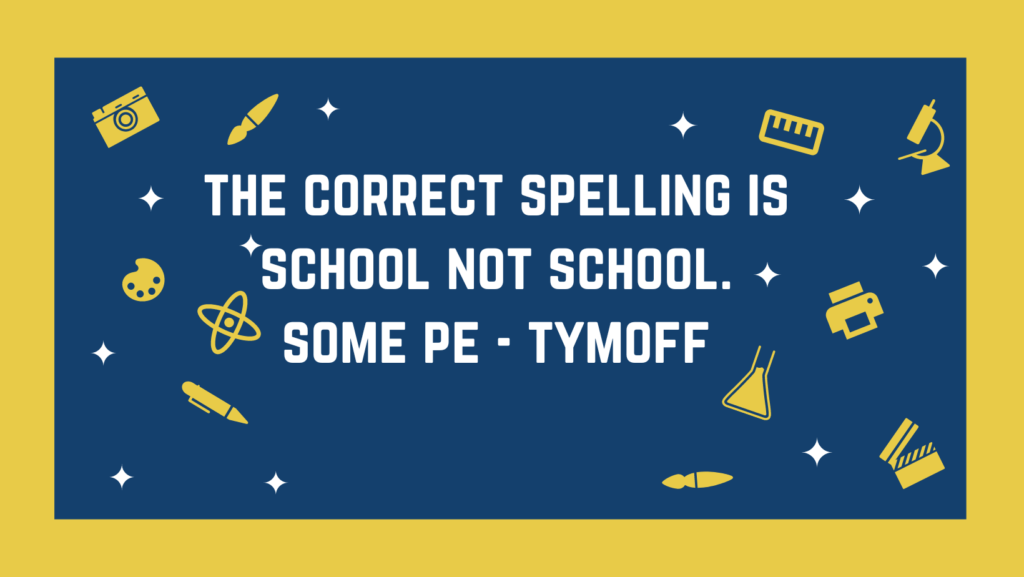In the excursion of learning and correspondence, spelling remains as a quiet sentinel, watching the doors of understanding and articulation. Today, we dive into an unusually named investigation: “the correct spelling is school not school. some pe – tymoff.” While the expression could stimulate the extravagant, it’s a fun loving gesture to the normal problems we face in dominating the English language. Thus, lock in as we set out on this instructive odyssey, unraveling the strings of spelling, history, and the computerized dance of letters on our screens.
Table of Contents
Introduction : the correct spelling is school not school. some pe – tymoff
At the core of our semantic experience is “school,” a term that reverberations through homerooms and encourages recollections of learning. The spelling “school,” as opposed to perky incorrect spellings or imaginative understandings, is established somewhere down ever. Beginning from the Greek “skhole,” signifying “recreation” and later “address place,” it cruised through Latin and Early English, transforming into the word we know today. This excursion from olden times to innovation features the word’s flexibility and the wealth of its legacy.
However, for what reason do we stagger over such a very much trampled word? The English language, with its embroidery woven from different tongues, frequently presents spelling as a riddle. “School” turns into a great representation, its right spelling an achievement for students. Normal entanglements incorporate phonetic disarrays or the appeal of rearrangements — changing “school” into “scool” or different variations. Perceiving these slips up as a feature of the expectation to learn and adapt energizes a kinder, more quiet way to deal with dominating spelling.
Unraveling “Some Pe – Tymoff”: A Linguistic Twist
Inserted inside our particular title is “the correct spelling is school not school. some pe – tymoff,” a series of letters that may at first riddle. This expression, apparently counter-intuitive, fills in as a fun loving sign of the phonetic undertakings and misfortunes in spelling. It underlines a pivotal part of language learning: the excursion from hearing sounds to connecting them to letters and words. Phonetic spelling, while frequently excused, assumes a significant part in early schooling, overcoming any issues among sound and content.
In this light, “the correct spelling is school not school. some pe – tymoff” could represent the exploratory period of spelling, where sounds don’t necessarily line up with the normal characters. It’s a demonstration of the imagination and challenge innate in language securing. Embracing these phonetic interests enhances how we might interpret spelling as well as praises the singular excursion every student leaves upon.
The Significance of Spelling in the Realm of Education
Spelling, frequently saw as a commonplace part of proficiency, holds unmatched importance in the instructive odyssey. Its right application shapes the bedrock of compelling correspondence and scholastic achievement. Spelling rises above simple letters on a page; it epitomizes the accuracy and unwavering focus, empowering students to convey their thoughts with certainty and precision. The dominance of spelling is likened to gaining a key that opens the gold mine of information and articulation.
Notwithstanding, the excursion to spelling capability is loaded with difficulties. The English language, a mosaic of sounds and images, gives students the overwhelming errand of retaining decides that are frequently interspersed with exemptions. “School” fills in as a reference point, directing students through the maze of letters, its right spelling an achievement in the excursion towards education. Underlining the significance of spelling inside the instructive structure sustains an age of expressive and smart communicators.
In the computerized age, the specialty of spelling faces new difficulties and amazing open doors. Messaging and online correspondence have presented a dictionary of truncations and shoptalk, obscuring the lines among formal and casual spelling. This computerized tongue, while enhancing the language in its way, highlights the requirement for a strong groundwork in spelling. Adjusting the comfort of innovation with the discipline of customary spelling rehearses guarantees that the quintessence of language is protected for people in the future.
Exploring the intricacies of spelling, from the verifiable underlying foundations of words like “school” to the phonetic riddles of expressions like “the correct spelling is school not school. some pe – tymoff,” enhances how we might interpret language. It features the unique interchange among custom and development, between the guidelines of syntax and the musicality of discourse. As we outline the course of spelling in the computerized period, we are helped to remember its persevering through esteem as a device for learning, correspondence, and association.
Embracing the Digital Dance of Letters: Spelling in the Age of Autocorrect
The jump into the advanced age has changed how we cooperate with language. Consoles have supplanted pen and paper, and screens are the new pages where our contemplations unfurl. This shift carries with it an extraordinary arrangement of difficulties and comforts, especially with regards to spelling. Autocorrect and prescient text, for example, have turned into the overlooked yet truly great individuals of our day to day correspondences, plunging in to save us from incorrect spellings with a blend of support and pomposity. However, this computerized wellbeing net likewise brings up issues about our dependence on innovation for spelling exactness.
The Double-Edged Sword of Technology
On one hand, innovation fills in as a strong partner in the fight against incorrect spellings. Devices like spell check have become priceless, particularly in expert and scholastic settings where accuracy matters. They assist us with keeping up with the honesty of our messages, it we’re seen precisely as planned to guarantee that. However, there’s a flip side. The comfort of autocorrect can prompt a reliance that could debilitate our spelling abilities after some time. It’s a difficult exercise between embracing innovative guides and holding our capacity to freely spell.
Maintaining Spelling Skills in a World of Autocorrect
How would we explore this new scene without losing our hold on the basics of spelling? The vital lies in cognizant practice and commitment with language, past the bounds of computerized stages. The following are a couple of systems to reinforce spelling abilities in the period of autocorrect:
- Careful Editing: Set aside some margin to survey messages and archives, even those considered “right” by spell check. This not just aides get any blunders that innovation could miss yet additionally supports your spelling abilities.
- Standard Perusing: Openness to many texts upgrades your experience with right spelling and jargon. It’s a detached at this point strong method for reinforcing your order of the language.
- Spelling Practice: Take part in spelling activities or games that challenge you without the security net of autocorrect. This can be particularly fun and powerful with applications intended for language learning.
Conclusion
The excursion through the universe of spelling, from the profundities of history to the computerized scope, is a demonstration of the developing idea of language. “School,” with its direct spelling, fills in as a reference point, directing us through the intricacies of English spelling. The fun loving diversion through “the correct spelling is school not school. some pe – tymoff” helps us to remember the delight and imagination inborn in language learning. As we graph our course in the advanced age, adjusting the comforts of innovation with the essential abilities of spelling, we find the genuine quintessence of correspondence: the capacity to communicate our thoughts obviously and interface with others.
Read More : FINDING PEACE: HOW I SLEEP AT NIGHT KNOWING I’M FAILING ALL MY CL – TYMOFF







